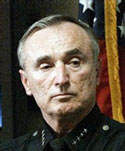CHARLENEM

LOS ANGELES (FinalCall.com) – The Los Angeles Police Department Board of Commissioners unanimously approved a new policy July 22 that mandates more training for officers involved in deadly use of force incidents and grants the police chief more oversight of when, why and how to discipline officers involved in shootings.
LAPD Commander Richard Webb explained during a Commissioner’s Special Meeting that prior to the change all “categorical use of force” cases were sent for review by Chief William Bratton, Andre Birotte, Jr., the LAPD Inspector General, and commissioners.
Categorical use of force incidents include the use of deadly force, such as shootings, unintended discharge of a firearm and chokeholds. Officers involved in such incidents underwent a tactical debrief that determined their effectiveness, areas of needed improvement and any additional training. A finding of administrative disapproval triggered a personnel complaint, which was permanently recorded in the officer’s file. Officers faced extensive mandatory retraining and were given a notice to correct deficiencies.
Under the new policy, the board reviews the cases and Chief Bratton determines the discipline, which could range from a talk between the offending officer and a captain, a warning, training or termination, according to Commander Webb. The ideal outcome is to enhance police performance on the front end, rather than after a crisis, he said.
“The chief has the statutory authority right now to do what he wants to on discipline anyway. This whole system that’s currently in existence is not written down as far as the imposition of discipline; it’s just something that kind of evolved,” Commander Webb said.
Geri Silva, executive director of Families To Amend California’s Three Strikes Law (F.A.C.T.S.), supports training, though it does not solve all use of force problems. She is wary of changes regarding personnel complaints.
“It would be fine if there wasn’t a history of abuse but Los Angeles is rampant with it. It’s like taking away what little safeguard or accountability that they have and giving discretion to the top cop, but all of this should be reviewed by the community that’s affected by it,” Ms. Silva said.
Inspector General Birotte said not much would change in terms of police oversight by the commissioners or the public and the new policy would further empower his office in use of force incidents. He said the focus should be on training and accountability, and the way to track both is through quarterly reviews.
Although the Board of Commissioners will still have an opportunity to see case outcomes in the end, they will not be able to take any action or reverse any of the police chief’s decisions, Inspector General Birotte told the Final Call.
“If there’s an incident of five years after the former incident, the lawyer and public who files a police abuse complaint will not be able to look in that cop’s file to see that there’s a pattern or practice of abuse. So police priors are only important if Bratton says they’re important? If they’re going to do that then they should wipe out the Three Strikes Law.”
According to Commander Webb, changes came about primarily because officers begrudgingly went to mandatory training after incidents. Since most force incidents result in findings of training, he said, there was no way to capture and present the chief’s, inspector general’s and board of commissioners’ concerns, he said.












